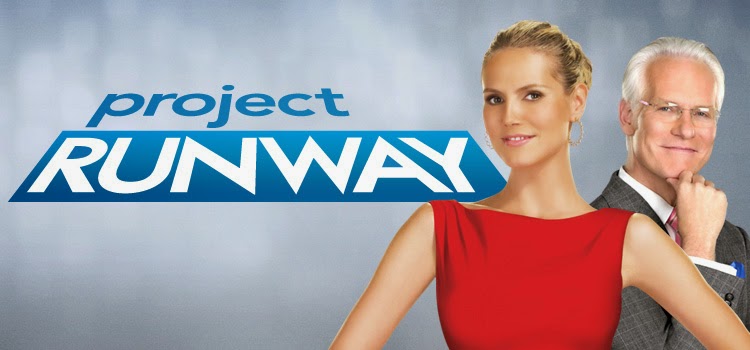
How are those Innovation Grant proposals going?
I’ve been hearing some good questions from your colleagues about the process, and I thought I would post some tips for generating grant-winning ideas. Here are five:
1. Think “Project Runway”
So if you’ve ever chatted with me for more than 5 minutes, then you probably know I’m a huge fan of “Project Runway.” I’ve watched this fashion competition since the first episode in 2004. I love Tim Gunn and the “unconventional materials” challenges the most, but I also reference the show when trying to explain the creative process. Specifically, how constraints tend to bring out the most creativity.
For example, the show is built around challenges for fashion designers: Limited time (usually a day or two), a limited budget ($200 at most) and a specific focus, such as fashion that looks good under black lights … or dresses made only out of stuff sold at a grocery store …. Or an outfit for professional stiltwalkers (this was real).
So when I’m asked about coming up with winning grant ideas, I analogize with “Project Runway.”
Think of yourself as the creative designer.
The grant rules and regulations …. i.e., the maximum budget, the allowable expenses, the funder’s mission (in this case, student retention!) … are the creative constraints.
Your job is to create a beautiful project within those constraints. Sometimes you have an idea that will work perfectly within those limits … and then sometimes those limits push you to a place you could have never imagined. I find that process exhilarating.
2. Try not to look at grants as extra work …
I know … you’re busy. We’re all busy. The last thing we want is to add more to the workload. So instead of approaching grants as one more burden, look at them as a tool for fixing problems. What are your pain points? What problems do you encounter in your classrooms, in the college’s processes, etc.? What are you always complaining about? How might a grant help address those problems… and might that solution benefit students and the whole college? A grant will help you prototype a possible solution.
3. Build on our strengths
On the flipside, consider the vast resources Virginia Western already offers. What do we do *really* well? This is the first example that comes to mind: We have lots of parking lots, so potential room for mobile services and food trucks. We now have a presence in the emerging downtown Roanoke “innovation corridor” through our involvement with the RAMP business accelerator … so how might we use that space? I’m sure there are many more examples. What do *you* do really well? What do you love the most about your job? How can we amplify your strengths … and strengths of this college … in a more innovative way? In the grants world, we like to use the fancy word “leverage” … how can we better leverage our resources?
4. This is professional development.
I lifted this idea from a Fast Company story about rethinking your career: Imagine your best, actualized self in 10 or 20 years. What are you doing? And what steps do you need to take tomorrow — and next year — to get there? Which leads me to this question: How might proposing a grant project help you grow out of your comfort zone and expand your professional horizons? I guarantee you will meet new people and learn more about the college and your community by going through a grant process.
5. This is not time wasted … even if you FAIL.
Speaking as a recovering perfectionist … the kind of high-achiever who tried to avoid failure throughout my formal schooling years … this has been one of my hardest life lessons. Yes, going through the grant process will take time. It will take effort. And you’re not guaranteed a payoff. The grant might not be awarded at the amount you requested … or at all. And that’s OK. You spent that time focusing on an idea that you love. You thought it through … you talked about it with colleagues, some of whom you hadn’t worked with before. There might be a better grant opportunity right around the corner. Or the idea will morph into something else … and get stronger. You are exploring and planting seeds and moving forward … and hopefully having fun. So don’t be afraid to just try. You never know where your first idea will lead.
Don’t forget! If you plan on submitting a proposal, consider signing up for the Innovation Grant Workshop (perhaps with your collaborative partner?).
I’m piloting some small, 1-hour workshops in the grants office on two dates so far … Wednesday, Feb. 7 (10 to 11 a.m.), and Thursday, Feb. 8 (3 to 4 p.m.).
During the workshop, we’ll go through the application step-by-step. Bring your questions … and a laptop or iPad if you want to write or edit your proposal as we talk.
I may schedule additional workshops (in groups or one-on-one) depending on the demand.
Please sign up for the limited number of spaces at this link:
http://www.signupgenius.com/go/5080c4aadaa28a1f85-innovation
Or reach out to me directly if those times/days don’t work for you:
Stephanie O. Seagle | sseagle@virginiawestern.edu | 857-6084.
And in case you missed it:
Thinking about an Innovation Grant? Don’t skip these important first steps (with downloadable grant application)






 Shelley Lyons is glad to be back on campus as she is a Virginia Western alum, and has served as the Administrative Officer for Grants Administration at Virginia Western since early 2022. Prior to VWCC, her career focus was within the Human Services and Arts fields. She wrote her first grant in 1996 on a whim and has continued to plan and learn since that time. She most enjoys seeing a well-planned project come to fruition, where funder, project manager and beneficiaries can all feel success and see impact.
Shelley Lyons is glad to be back on campus as she is a Virginia Western alum, and has served as the Administrative Officer for Grants Administration at Virginia Western since early 2022. Prior to VWCC, her career focus was within the Human Services and Arts fields. She wrote her first grant in 1996 on a whim and has continued to plan and learn since that time. She most enjoys seeing a well-planned project come to fruition, where funder, project manager and beneficiaries can all feel success and see impact.